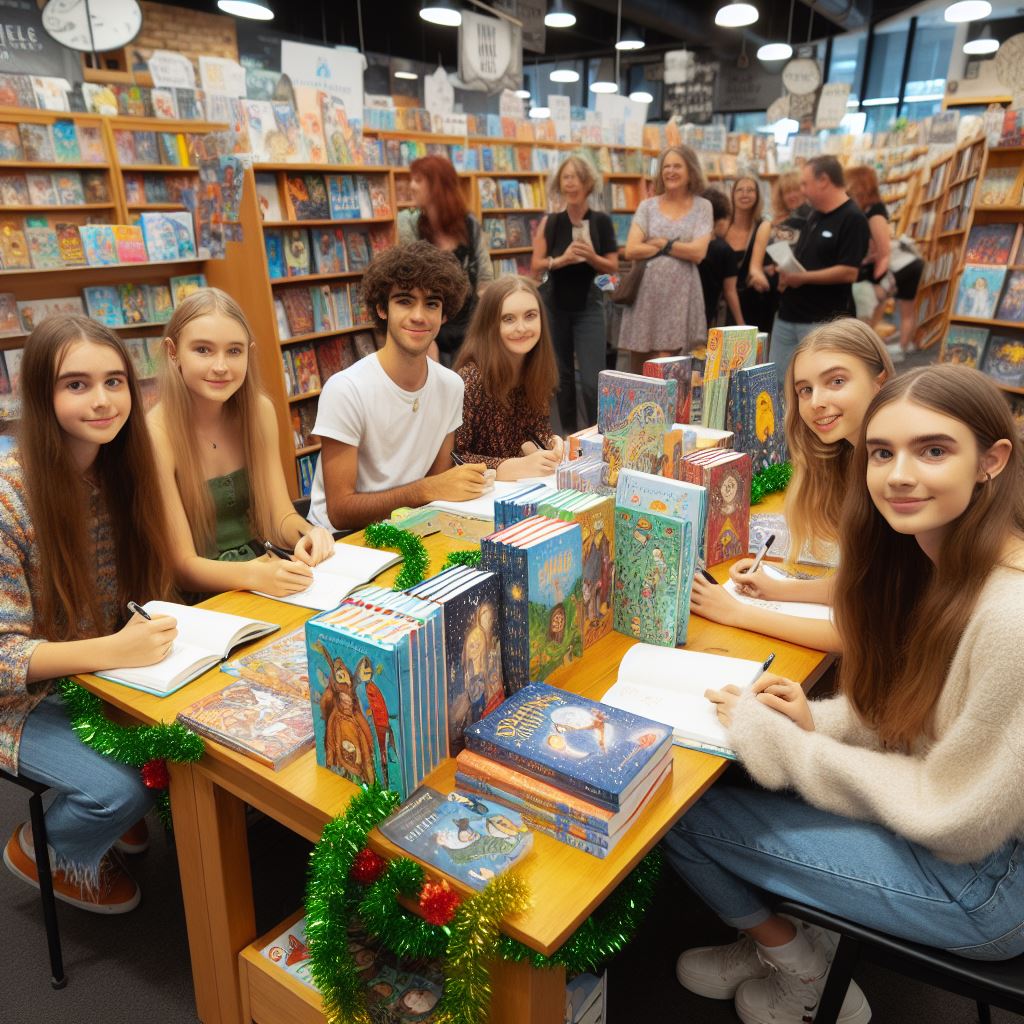Introduction
Australian writers rely on grants to nurture creativity and fund projects. Understanding the application process is crucial. Grants support research, publishing, and professional development. They help writers explore new ideas and expand audiences.
Navigating grant options can overwhelm aspiring writers. This guide simplifies the process. We’ll discuss government-funded programs and private foundations. Understanding eligibility criteria is vital. Crafting compelling proposals demands clarity and specificity.
Demonstrating project significance is essential. Avoid common application pitfalls with attention and research. Effective budgeting and expense justification ensure accountability. Successful writers and industry experts provide insights.
This guide caters to seasoned authors and newcomers. Writing grants empower literary pursuits. Mastering grant writing unlocks creative potential.
Explore novel, poetry, or non-fiction grants. With determination, transform aspirations into achievements. Unleash creativity and leave a mark in Australian literature.
Understanding Grants
In Australia, grants are financial assistance provided by various sources to support specific projects or organizations. A grant can be defined as a sum of money awarded to individuals or groups to help them achieve their goals and objectives.
Grants serve the purpose of funding activities that contribute to the betterment of society or fulfill a specific need. They can be instrumental in promoting research, supporting community initiatives, or advancing the arts, education, and healthcare sectors.
In Australia, there are several types of grants available. These include government grants, private foundation grants, and corporate grants.
Government Grants
Government grants, as the name suggests, are provided by government agencies at different levels (federal, state, or local). They can be targeted towards various areas such as research and development, community development, small business support, healthcare, or environmental conservation. These grants play a significant role in fostering innovation, economic growth, and social welfare.
Private Foundation Grants
Private foundation grants are offered by philanthropic organizations or individuals. These grants are typically centered around specific causes or issues, such as healthcare, education, poverty alleviation, or environmental sustainability.
Private foundations usually have their own selection criteria and application processes. They often seek innovative projects or initiatives that align with their philanthropic objectives.
Corporate Grants
Corporate grants are provided by companies or businesses as part of their corporate social responsibility initiatives. These grants are designed to support projects or programs that benefit the community or align with the company’s values and goals.
Corporate grants can be in the form of cash contributions, in-kind support, or partnerships with organizations to achieve shared objectives.
Researching and identifying suitable grants is crucial for individuals or organizations seeking funding. It is essential to understand the specific requirements, eligibility criteria, and goals of each grant opportunity to ensure a successful application.
Conducting thorough research allows applicants to find grants that align with their project or organization’s objectives, activities, and target demographic. It also helps in identifying potential funders who have a history of supporting similar projects or causes.
By tailoring grant applications to fit the requirements and goals of specific grants, applicants increase their chances of securing funding. Adequate preparation and attention to detail are vital in crafting a compelling proposal that highlights the project’s merits and demonstrates its potential impact.
Moreover, staying updated on grant opportunities and deadlines is crucial as the availability of grants can change over time. Being proactive in monitoring grant announcements and related resources ensures that individuals and organizations do not miss out on funding opportunities that may be applicable to their projects.
Generally, grants are a valuable source of financial support for various projects and organizations in Australia. Understanding the different types of grants available and conducting thorough research are essential steps in securing funding.
By effectively identifying suitable grants and crafting compelling proposals, individuals and organizations can maximize their chances of receiving the necessary financial assistance to pursue their objectives and contribute to the betterment of society.
Read: Australian Music Awards: A Closer Look
Getting Started with Grant Writing
- Successful grant writers possess essential skills and qualities such as excellent research capabilities, strong written communication, and attention to detail.
- Understanding the grant application process and guidelines is crucial for a writer to craft a proposal that aligns with the funding organization’s objectives.
- Organizing and structuring a grant proposal is vital as it helps present a clear and coherent narrative that convinces the grantors of the project’s value.
Researching Grant Opportunities
- It is essential to conduct thorough research to find appropriate grants.
- Government websites, online databases, and industry-specific sources are valuable resources for finding grant opportunities in Australia.
- Aligning grant goals and objectives with the funder’s priorities is significant for success.
When it comes to writing grants in Australia, conducting thorough research is of utmost importance. By investing time and effort into researching grant opportunities, individuals or organizations can increase their chances of securing the appropriate funding for their projects or initiatives.
Various resources for finding grant opportunities in Australia (e.g., government websites, online databases, industry-specific sources)
There are various resources available for finding grants in Australia. Government websites are a valuable starting point, as they often provide information about different grant programs, eligibility criteria, and application deadlines.
Online databases dedicated to grants can also be beneficial, as they compile a wide range of funding opportunities from different sources.
Your Personalized Career Strategy
Unlock your potential with tailored career consulting. Get clear, actionable steps designed for your success. Start now!
Get StartedIn addition to official channels, industry-specific sources can be excellent avenues for discovering grant opportunities. Professional associations, trade publications, and networking events related to one’s field or sector often share information about available grants.
By keeping a finger on the pulse of industry-specific news and developments, individuals and organizations can stay informed about potential funding opportunities that align with their goals and objectives.
The significance of aligning grant goals and objectives with the funder’s priorities
Aligning grant goals and objectives with the priorities of the potential funder is crucial for a successful application. Funders often have specific focus areas or target outcomes for their grant programs.
Therefore, it is essential to thoroughly research the funder’s mission, values, and funding priorities before applying. By aligning project objectives with the funder’s priorities, applicants can demonstrate a strong fit and increase their chances of securing the grant.
Furthermore, researching the previous grants awarded by a specific funder can provide valuable insights into their funding preferences and priorities.
By analyzing past grant recipients’ projects, individuals or organizations can gain a better understanding of what the funder values and what types of initiatives have been successful in the past.
This information can inform the development of a compelling grant proposal that aligns with the funder’s interests.
Basically, thorough research is a critical step when it comes to writing grants in Australia. Utilizing resources such as government websites, online databases, and industry-specific sources can significantly increase the chances of finding suitable grant opportunities.
Moreover, aligning grant goals and objectives with the funder’s priorities is essential for a successful application. By investing time and effort into research, individuals and organizations can position themselves for grant success.
Read: Music Production: A Guide for Aussies
Crafting an Effective Grant Proposal
In order to craft an effective grant proposal, there are several essential components that must be included. These components help to provide a clear and comprehensive overview of the project and its goals.
Executive Summary
The executive summary is a brief overview of the project proposal. It should provide a concise summary of the project, its objectives, and the intended outcomes. This is often the first section that funders read, so it needs to be compelling and capture their attention.
Project Description
The project description is a detailed explanation of the project, including its purpose, goals, and methodology. It should clearly articulate the problem or need that the project aims to address and explain why it is important.
This section should also outline the specific activities and strategies that will be implemented to achieve the desired outcomes.
Budget
The budget section outlines the financial aspects of the project. It should include a detailed breakdown of the expected expenses and how the funds will be allocated.
This section is important to demonstrate that the project has been well-planned and that the requested amount is reasonable and justified.
Evaluation Plan
The evaluation plan outlines how the project’s success will be measured and assessed. It should include specific metrics and indicators that will be used to evaluate progress and determine if the project’s goals have been achieved.
This section demonstrates the project’s accountability and ensures that the funder can see the impact of their investment.
When it comes to writing a compelling narrative, it is important to clearly articulate the project’s goals, impact, and feasibility.
Tips for Writing a Compelling Narrative
- Focus on the project’s goals: Clearly articulate what the project aims to achieve and why it is important. Use language that conveys the significance and urgency of the issue.
- Highlight the project’s impact: Explain how the project will make a difference and improve the lives of the target beneficiaries. Use specific examples or stories to illustrate the potential impact.
- Demonstrate feasibility: Show that the project is well-planned and achievable. Provide evidence of the organization’s capacity and expertise to successfully implement the project. Address any potential challenges or risks and explain how they will be mitigated.
Another important aspect of writing a grant proposal is addressing the funder’s requirements and demonstrating sustainability.
Importance of Addressing the Funder’s Requirements
Funders often have specific guidelines and requirements that must be followed when submitting a grant proposal. It is crucial to carefully review these requirements and tailor the proposal accordingly. Failure to do so may result in the proposal being rejected without further consideration.
Stand Out with a Resume That Gets Results
Your career is worth more than a generic template. Let us craft a resume and cover letter that showcase your unique strengths and help you secure that dream job.
Get HiredImportance of Demonstrating Sustainability
Funders want to invest in projects that will have a lasting impact. It is important to demonstrate the project’s sustainability beyond the funding period. This can be done by outlining plans for ongoing funding, partnerships, or strategies for long-term impact.
Ultimately, crafting an effective grant proposal requires attention to detail and a clear understanding of the essential components. By including an executive summary, project description, budget, and evaluation plan, the proposal provides a comprehensive overview.
Additionally, writing a compelling narrative that clearly articulates the project’s goals, impact, and feasibility is essential. Finally, addressing the funder’s requirements and demonstrating sustainability increases the chances of securing funding for the project.
Read: How to Network in Australia’s Music Scene

Learn More: Sydney’s Best Writing Workshops in 2024
Perfecting the Grant Application
When it comes to writing grant proposals in Australia, perfecting your application is essential. Not only will a well-crafted proposal increase your chances of success, but it also showcases your professionalism and dedication.
Here are some tips to help you proofread and edit your grant proposal for clarity, coherence, and professionalism.
Proofreading and Editing for Clarity
- Read your proposal aloud to identify any awkward or unclear sentences.
- Ensure that your language is clear, concise, and free of jargon.
- Check for proper grammar, punctuation, and spelling throughout the document.
- Make sure your sentences flow smoothly and logically.
- Remove any unnecessary or repetitive information.
Remember, the goal of your grant proposal is to clearly communicate your project and its potential impact. By proofreading and editing for clarity, you can ensure that the reviewers easily understand your proposal.
Seeking Feedback and Involving Reviewers
- Before submitting your grant application, seek feedback from colleagues or mentors.
- Ask them to review your proposal for clarity, coherence, and feasibility.
- Consider involving reviewers who have experience with grant applications.
- Their insights can help you improve your proposal and address any potential weaknesses.
- Take their feedback seriously and make necessary revisions based on their suggestions.
Involving reviewers or seeking feedback before submission is crucial for a successful grant application. Their fresh perspective can help you identify areas that need improvement and strengthen your overall proposal.
Adhering to Deadlines and Required Documentation
- Understand the deadline for submitting your grant application and plan your time accordingly.
- Create a timeline to ensure that you complete all necessary components before the deadline.
- Gather all required documentation, such as financial statements, project plans, and supporting materials.
- Review the grant guidelines to ensure you meet all the requirements.
- Double-check that you have included all the necessary paperwork and supporting documents.
Failing to adhere to deadlines or submit all required documentation can result in your grant application being disqualified. It is crucial to stay organized and ensure that you have completed all necessary paperwork before submitting your proposal.
Perfecting your grant application involves careful proofreading and editing for clarity, seeking feedback from reviewers, and adhering to deadlines and required documentation. By following these steps, you can increase your chances of securing the funding you need for your project.
Read: The Evolution of Australian Music Genres
Discover More: Day in the Life of Aussie Screenwriters
Following Up on Grant Applications
Typical Timeline for Hearing Back from Funders
- Funders usually take 4-8 weeks to review grant applications and make a decision.
- Some funders may have specific timelines mentioned in their guidelines or website.
- It’s important to be patient during this time and avoid continuous follow-ups.
Appropriate Steps to Take after Submitting a Grant Application
- Send a thank-you note to the funder expressing gratitude for the opportunity to apply.
- Keep a record of the date and time you submitted the application, along with any confirmation.
- Regularly track the progress of your application through the funder’s provided tracking system or contact person.
Guidance on Responding to Grant Rejections or Requests for Further Information
- Upon receiving a rejection, do not get disheartened and view it as a learning experience.
- Ask for feedback from the funder to understand the areas that need improvement.
- Analyze the feedback and make necessary changes in your future grant applications.
- If the funder requests further information, respond promptly and provide the requested details.
- Ensure that the additional information addresses the funder’s concerns or questions effectively.
- Seek clarification if any part of the request is unclear and provide accurate and concise information.
List of Additional Tips for Following Up on Grant Applications
- Avoid excessive follow-ups as it may hinder the review process.
- Adhere to any specific follow-up instructions mentioned by the funder.
- Make use of the tracking system or contact person to stay updated on the status of your application.
- Be prepared to provide additional supporting documents if requested by the funder.
- If you receive funding, promptly send a thank-you note to show appreciation and maintain a positive relationship.
- Maintain a professional and courteous approach throughout the follow-up process.
- Seek guidance from experienced grant writers or professionals in the field for valuable insights and advice.
In fact, following up on grant applications requires patience, promptness, and professionalism. Understanding the typical timeline, taking appropriate steps after submission, and effectively responding to rejections or additional requests can greatly impact your chances of success in the grant application process.
Grant writing is a continuous learning process, and each application serves as an opportunity to improve and enhance future proposals. Stay diligent, persistent, and positive in your pursuit of grants to increase your chances of securing funding for your endeavors.
Discover More: Australian Journalists & Social Media
Conclusion
Recap of the key points discussed in the blog post
In this blog post, we discussed the importance of grant writing in Australia and provided a step-by-step guide on how to write grants effectively.
We highlighted the need for clear and concise language, a strong understanding of the funding guidelines, and the importance of addressing the needs of the target audience.
Transform Your LinkedIn for Maximum Impact
Elevate your professional brand with a LinkedIn profile that attracts recruiters, showcases your expertise, and maximizes opportunities. Stand out in your industry with a profile built for success.
Boost ProfileTo recap, we highlighted the key components of a grant proposal, including the problem statement, goals and objectives, budget, and evaluation plan. We also discussed the significance of storytelling and providing evidence of impact to make the proposal more compelling.
Encouragement for readers to explore grant writing further and consider it as a valuable career option in Australia
We encourage readers to explore grant writing further and consider it as a valuable career option in Australia.
With the increasing demand for funding in various sectors, such as healthcare, education, and the arts, skilled grant writers play a crucial role in securing financial support for organizations and initiatives.
Additional resources or recommended reading for those interested in grant writing
For those interested in grant writing, we recommend exploring the resources and reading materials provided by reputable organizations such as the Australian Association of Grantmakers and the Australian Government GrantConnect website.
These resources offer further guidance, tips, and examples to help aspiring grant writers refine their skills.
In closing, grant writing is a rewarding profession that allows individuals to make a positive impact in their communities. By mastering the art of writing persuasive and compelling grant proposals, one can contribute to the success of numerous projects and initiatives across Australia.




